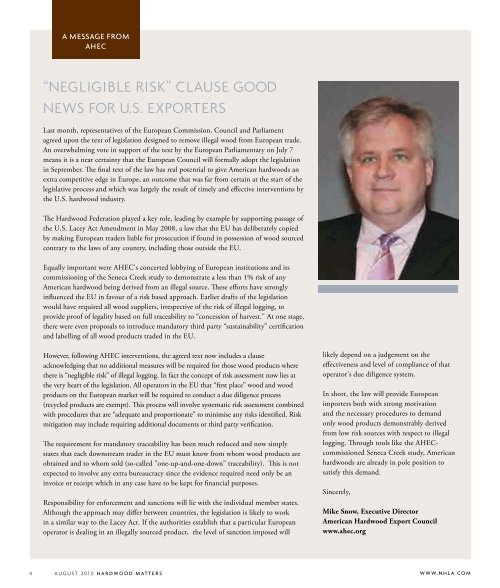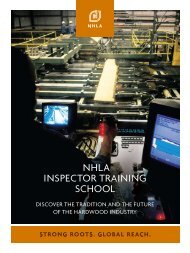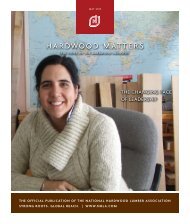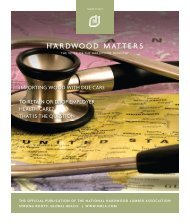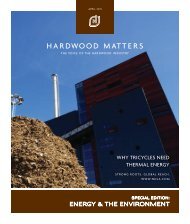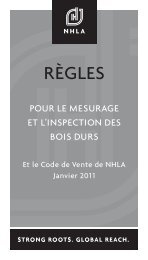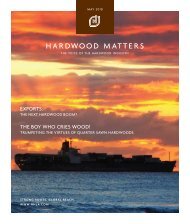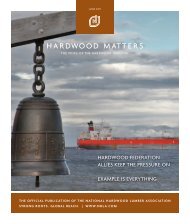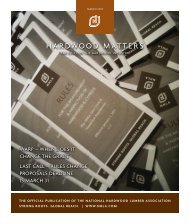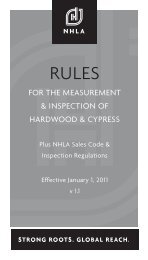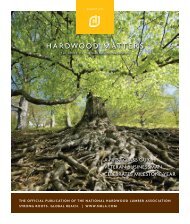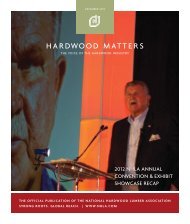Hardwood Matters - National Hardwood Lumber Association
Hardwood Matters - National Hardwood Lumber Association
Hardwood Matters - National Hardwood Lumber Association
- No tags were found...
Create successful ePaper yourself
Turn your PDF publications into a flip-book with our unique Google optimized e-Paper software.
A MESSAGE FROM<br />
AHEC<br />
“NEGLIGIBLE RISK” CLAUSE GOOD<br />
NEWS FOR U.S. EXPORTERS<br />
Last month, representatives of the European Commission, Council and Parliament<br />
agreed upon the text of legislation designed to remove illegal wood from European trade.<br />
An overwhelming vote in support of the text by the European Parliamentary on July 7<br />
means it is a near certainty that the European Council will formally adopt the legislation<br />
in September. The final text of the law has real potential to give American hardwoods an<br />
extra competitive edge in Europe, an outcome that was far from certain at the start of the<br />
legislative process and which was largely the result of timely and effective interventions by<br />
the U.S. hardwood industry.<br />
The <strong>Hardwood</strong> Federation played a key role, leading by example by supporting passage of<br />
the U.S. Lacey Act Amendment in May 2008, a law that the EU has deliberately copied<br />
by making European traders liable for prosecution if found in possession of wood sourced<br />
contrary to the laws of any country, including those outside the EU.<br />
Equally important were AHEC's concerted lobbying of European institutions and its<br />
commissioning of the Seneca Creek study to demonstrate a less than 1% risk of any<br />
American hardwood being derived from an illegal source. These efforts have strongly<br />
influenced the EU in favour of a risk based approach. Earlier drafts of the legislation<br />
would have required all wood suppliers, irrespective of the risk of illegal logging, to<br />
provide proof of legality based on full traceability to “concession of harvest." At one stage,<br />
there were even proposals to introduce mandatory third party “sustainability” certification<br />
and labelling of all wood products traded in the EU.<br />
However, following AHEC interventions, the agreed text now includes a clause<br />
acknowledging that no additional measures will be required for those wood products where<br />
there is “negligible risk” of illegal logging. In fact the concept of risk assessment now lies at<br />
the very heart of the legislation. All operators in the EU that “first place” wood and wood<br />
products on the European market will be required to conduct a due diligence process<br />
(recycled products are exempt). This process will involve systematic risk assessment combined<br />
with procedures that are “adequate and proportionate” to minimise any risks identified. Risk<br />
mitigation may include requiring additional documents or third party verification.<br />
The requirement for mandatory traceability has been much reduced and now simply<br />
states that each downstream trader in the EU must know from whom wood products are<br />
obtained and to whom sold (so-called "one-up-and-one-down" traceability). This is not<br />
expected to involve any extra bureaucracy since the evidence required need only be an<br />
invoice or receipt which in any case have to be kept for financial purposes.<br />
Responsibility for enforcement and sanctions will lie with the individual member states.<br />
Although the approach may differ between countries, the legislation is likely to work<br />
in a similar way to the Lacey Act. If the authorities establish that a particular European<br />
operator is dealing in an illegally sourced product, the level of sanction imposed will<br />
likely depend on a judgement on the<br />
effectiveness and level of compliance of that<br />
operator's due diligence system.<br />
In short, the law will provide European<br />
importers both with strong motivation<br />
and the necessary procedures to demand<br />
only wood products demonstrably derived<br />
from low risk sources with respect to illegal<br />
logging. Through tools like the AHECcommissioned<br />
Seneca Creek study, American<br />
hardwoods are already in pole position to<br />
satisfy this demand.<br />
Sincerely,<br />
Mike Snow, Executive Director<br />
American <strong>Hardwood</strong> Export Council<br />
www.ahec.org<br />
4 AUGUST 2010 HARDWOOD MATTERS WWW.NHLA.COM


